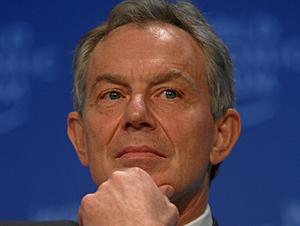Blair to Iraq inquiry: No regrets
Former British Prime Minister Tony Blair (Image by Flickr user World Economic Forum (cc: by-nc-sa))
This story is adapted from a broadcast audio segment; use audio player to listen to story in its entirety.
Story by Laura Lynch, PRI’s “The World”
Tony Blair remains unrepentant nearly seven years after ordering British troops join the US invasion of Iraq. The former prime minister testified for six hours at an inquiry into Britain’s role in the Iraq War. Blair stated that knowing what he knows today, he would still have gone to war to remove Saddam Hussein.
Well rehearsed in defending an unpopular war, Blair’s hands trembled slightly as he readied himself for a round of questions. Within minutes, he was on familiar ground, repeating his view that the attacks of September 11, 2001, were reason enough to take a hard look at Saddam Hussein.
“That completely changed our assessment of where the risks for security lay,” he testified. “And just so we make this absolutely clear, this was not an American position, this was my position and the British position. Very, very clearly.”
It’s no surprise Blair wanted to be so clear. He’s long been accused of doing the bidding of George W. Bush in Iraq. At the inquiry, Blair was asked time and again about the former US president: How he reacted to Blair’s promised; what he expected from Britain. Blair denied any secret deals, but he did tell Bush he would stand with him.
“I think what he took from that was exactly what he should have taken,” Blair said. “Which is, if it came to military action because there was no way of dealing with this diplomatically, we would be with him. And that was absolutely clear. Because as I’ve set out publicly, not privately, we had to confront this issue. It could be confronted by a sanctions framework that’s effective — for the reasons I’ve given, we didn’t have one. It could be confronted by UN inspections framework — we’ll come to that. Or alternatively, it would have to be confronted by force.”
The questioning wore on about whether Blair exaggerated the threat posed by Saddam, and about whether he had a strong legal case to go to war without explicit UN support. Blair stood firm. He made the right decision, he said, for the right reasons.
“As I sometimes say to people, this isn’t about a lie or a conspiracy or a deceit or a deception; it’s a decision. And the decision I had to take was, given Saddam’s history, given his use of chemical weapons, given the over one million people whose deaths he caused, given ten years of breaking UN resolutions, could we take the risk?”
Blair tried to deflect several questions by focusing on the Iraq of today. Iraqis, he said, are better of now than they were in 2003.
That prompted inquiry commissioner Lawrence Freedman to recite what he called “project statistics” — Iraqis who have died in recent years. “One thousand and forty-two in January 2005; 1,433 in January 2006; 2,807 in January 2007. These are the monthly figures. These are the documented deaths; they’re not the deaths from the deterioration in services, poverty or health, and so on. The striking thing is, they’re getting worse each year.”
In the final minutes, Blair said he was sorry for the deep divisions the Iraq War caused in Britain. But that seemed to be about as far as he would go with apologies, to the evident frustration of those sitting just feet away.
Midway through this statement, some in the room protested out loud and had to be told to quiet down: “I’ve no regret. Responsibility, but not a regret for removing Saddam Hussein. I think that he was a monster. I believe he threatened not just the region, but the world.”
His defense complete, Blair left quickly, his body guards close behind. The families too made their way outside. Many like Reg Keyes, upset by what they had just seen and heard.
“He had an opportunity there to apply some soothing balm to some of the open wounds of grief that are in that room,” said Keyes. “I saw a couple of mothers in there break down at the end in tears, because the man — all he had to say to massage the grief was ‘I do regret the loss of life’, but he was quite remorseless. Not regret at all.”
No one really expected Blair to back down, to admit mistakes or reconsider. He said he would do it all again in the name of making Britain safer. But in the same week, British officials raised the country’s threat level to severe. Many still believe Blair sent his troops into an illegal war, with questionable results.
PRI’s “The World” is a one-hour, weekday radio news magazine offering a mix of news, features, interviews, and music from around the globe. “The World” is a co-production of the BBC World Service, PRI and WGBH Boston. More “The World.
Every day, reporters and producers at The World are hard at work bringing you human-centered news from across the globe. But we can’t do it without you. We need your support to ensure we can continue this work for another year.
Make a gift today, and you’ll help us unlock a matching gift of $67,000!
